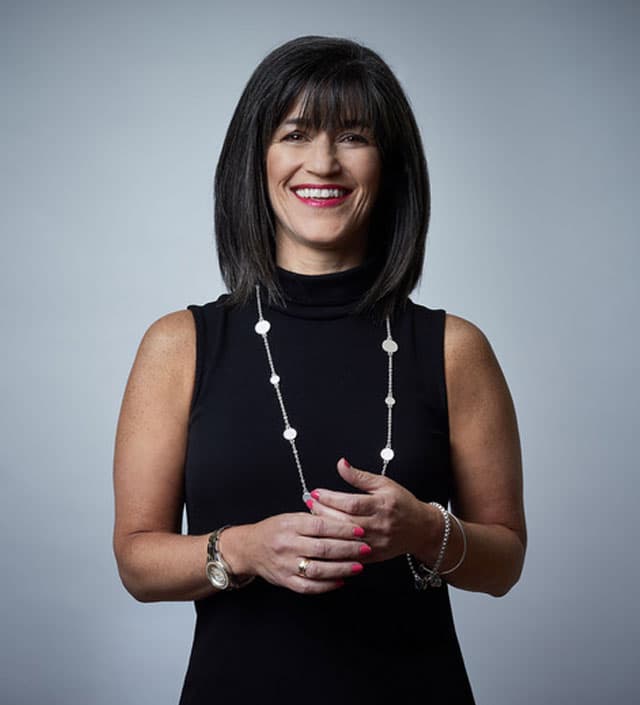Investment professional Jenine Garrelick knows whereof she speaks. Many women who have become advisors have done so because of something that shook up their lives, she says.
This could be early widowhood or watching their parents struggle financially.
Or a difficult divorce.
That’s Garrelick’s story. She’s senior managing director of U.S. Retail at MFS Investment Management, Boston, and is passionate about encouraging women to take charge of their finances.
“I went through a divorce when I was younger. I got married young. Literally, he was a financial nightmare: drinking problem, bounced checks, bad credit,” she says.
“But what I realized was, even though I was in tough shape, I still ended up in this industry,” says Garrelick, who heads up the firm’s business development team and works with financial advisors on investments and practice management.
“Literally, every single month, I took out $25 from my paycheck and that is how I learned the power of compounding. Previously, the only thing I knew about the power of compounding were credit card bills that were compounding!’’
Garrelick had a second unsuccessful marriage that she survived in better shape — “I was able to walk away from it.’’ She says she is now on her third and hopefully her last marriage.
Financial dependence and ignorance of how money works make unhappy bedfellows, she says.
“I see so many women stay in unhappy relationships because they don’t have a choice,” she says. “I have spent a tremendous amount of time trying to educate women to take control of their finances. To be financially independent is freedom in its truest form.’’
Women advisors still underrepresented
Garrelick, 50, joined MFS in 2007, just a year before the Great Recession. “It was quite a hectic time in our offices,’’ she says. But MFS prevailed, as it had in 1929 and during other bust eras. (The company, which has nine investment offices in the U.S. and abroad, will celebrate its 100th year in 2024.)
What has also remained fixed since Garrelick joined the wealth management industry is the small number of women financial advisors. She puts the total around 30%, which is higher than some industry measures.[https://www.cfp.net/news/2023/01/cfp-board-exceeds-95000-cfp-professionals]
Horror stories about married women or widows with adult children being ignored in meetings with financial advisors have inspired countless firings of advisors after a husband dies or the woman gets her financial mojo together.
Yet women who want to work with female advisors may be hard pressed to find them given the industry makeup.
Although Garrelick holds a bachelor of science in mathematics, she says that the industry, in order to increase the ranks of female advisors, needs to get the word out that it’s not just about the numbers. Many women don’t realize that a big part about being an advisor is relationship building.
Another drawback in attracting more women to the industry, she says, is that many don’t feel comfortable with the industry’s dependence on commission-based compensation. What they don’t realize is that many advisors and advisory firms no longer or never did use this business model.
Not ‘one-size-fits-all’
Meanwhile, the industry has to do a better job educating its practitioners. Advisors “must understand that working with women [clients] is not a one-size-fits-all approach,” says Garrelick.
“Look at the multiple generations of women out there, from baby boomers to Gen Xers, millennials and now the new grads of Gen Z. They all face different challenges than previous generations,” she says.
“I always say if you are talking to a 50-year-old woman today, you can’t make assumptions about what her world looks like.”
— Jenine Garrelick, MFS Investment Management
“I always say if you are talking to a 50-year-old woman today, you can’t make assumptions about what her world looks like,” she says. “If you go back to my mother’s generation, most women got married fresh out of college, then stayed at home and raised the family. That is just not the case anymore.”
Not only are women making more money than in the past, some are participating in the great wealth transfer, and many are they’re seeking advice. Statistically speaking, women also live longer and often outlive their spouses, Garrelick adds.
For these reasons, “we hear more and more that advisors want to connect with women,” she says. In fact, “if you’re going to have a growing practice, you’ve got to connect with women.”
And woe to the advisor who ignores the children and grandchildren of a client, Garrelick says.
“A lot of times, women are influenced by their kids, so we have to think about [getting to know] the next generations,” she says. “Kids have input of where that money flows to.”
What women really want to know
“A lot of our industry is based on communication through numbers and graphs and charts,” says Garrelick. And while communicating about performance is important, this should not be the ultimate discussion.
“When you communicate with women, they want to know what the money can do for their lives,” she says. “There’s more of a psychology to it than just talking about the volatility of the market. Really, it’s just asking more questions and listening.’’
In addition, “We find that women like guarantees,” she says, and that “women tend to be more philanthropic.”
It’s also important to think about how to educate female clients, whom Garrelick says tend to “want more guarantees.”
MFS Investment Management holds various presentations for clients on topics such as Medicare and Social Security. “Our Social Security presentation is extremely popular with widows and divorcees,” says Garrelick, whose business development team speaks directly to end clients on behalf of advisors organizing these events.
“Social Security is one of those topics that everyone is going to need to tackle at some point,” she says. “You need to make sure you know the right questions to ask about how to make the most of your benefits and so on.”
Another MFS presentation focuses on caregiving in its different guises. It was created by a former MFS Investment Management employee who was forced to learn about all the medical and financial nuances of caring for her terminally ill husband.
Garrelick also recommends that advisory firms form their own committee of female clients to share their perspective and educate the advisory team. “If you are a male advisor, that can kind of walk you through their experience,” she says.
Expanding client outreach
Advisors who are embedded in their communities — volunteering at and sponsoring local events, attending charitable events and hosting educational events — improve their opportunities to meet potential clients. Such contact gives female (and male) prospects the opportunity to engage with advisors, get a sense of who they are, and learn their reputation, says Garrelick.
Advisors also need to be patient when onboarding female clients.
“Women shop around for a lot of things. We take our time before we commit,” says Garrelick, including selecting an advisor to work with
On the flip side, she tells investors, “There’s no reason to rush it if you are thinking long term and want to make sure the advisor is someone who has a solid reputation in the community and has strong word-of-mouth reputation around town.”
Aside from its popular Savvy Women seminars, MFS Investment Management encourages advisors to hold events that bring mothers and daughters together, such as on Mother’s Day.
Further, “We encourage advisors to make sure the office is user friendly if someone has kids or an elderly parent with them,’’ Garrelick said.
An age-old challenge
Despite women’s advances in the workplace over the past 50 years, there is one cultural benchmark that Garrelick says has not changed enough:
“We continue to see younger women who are financially more educated than previous generations, but what happens after they get married? They tend to delegate financial responsibility to their husbands,” she says.
Often, it’s not about lack of interest but rather about lack of time.
“Think about all the juggling women are doing, more than they ever have, so they tend to delegate (financial responsibility),” says Garrelick. “Even among professionals, women are still more in charge of the kids, still having the caregiving responsibility. And housework? That is not an even divide.’’
In a four-decade career in journalism, Eleanor O’Sullivan has reviewed many books on best practices for financial advisors, has written for Financial Advisor and the USA Today network, and was the movie critic for the Asbury Park Press.







